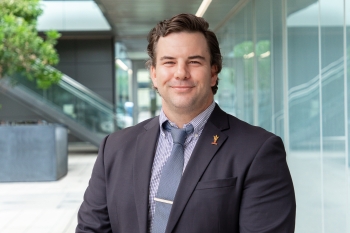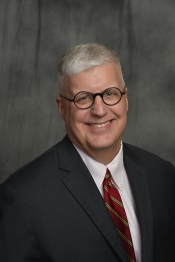
ASU Law launches health care law and administration degree emphasis
Health care is the largest and fastest growing industry in the U.S., with data from the U.S. Bureau of Labor Statistics indicating that health care occupations are estimated to grow by 13% between 2021 and 2031.
And while medical knowledge is a necessity that goes without saying for those in the field, legal knowledge is increasingly important as well.

“We’ve had physicians inquire about taking courses at the law school for years, but after going through medical school and residency programs, another three years of law school through a JD program just isn’t feasible for many of them,” said Joey Dormady, assistant dean of graduate programs and new education initiatives at the Sandra Day O'Connor College of Law at Arizona State University.
To that end, ASU Law has launched the health care law and administration emphasis within its Master of Legal Studies (MLS) program, which was created for students interested in understanding law but not practicing it. The new emphasis, which is available for students to pursue online, will be a perfect fit for health care professionals interested in understanding the legal framework that governs the field’s operations, policies and patient care.
“Law school isn’t just for lawyers," Dormady said. "Health care administrators need a deeper understanding of the law to do their jobs. The curriculum designed for these administrators and physicians will fill a gap needed to support the growing need for health care.”
Classes — several of which are brand-new to ASU Law — will touch on topics ranging from patient privacy (HIPAA) concerns, medical malpractice issues and end-of-life care decisions to protecting organizational financial stability and health care facility regulations. The 30-credit degree program requires no entrance exam, but applicants must have a bachelor’s degree to be considered for admission.
The current MLS degree emphasis in corporate and health care compliance is accredited by the Corporate Compliance Board, which is the certification body for professional organizations like the Society of Corporate Compliance and Ethics (SCCE) and the Health Care Compliance Association (HCCA). The new emphasis will add to ASU Law’s robust health law offerings and address additional health care issues, like the rising costs of medical litigation and breaches of duty insurance premiums, to drive down medical care costs for the community.

Dr. John Shufeldt, founder and board chair for Tribal Health and managing director for Xcellerant Ventures, which invests in health care companies, said it’s amazing what medical professionals don’t know about the law.
“I’m amazed at what physicians don’t know that they really should know about the law, and I was one of them,” he said. “No one ever tells you these things. You go down these paths you think are very innocuous, and you can get into significant trouble with the medical malpractice side of it, things that you can write or don’t write, do or don’t do, that impact the likelihood of being sued.”
Shufeldt will be an instructor in the program. He has practiced emergency medicine for over 35 years and decided to hedge his bets for the future when he graduated from ASU Law in 2005 with his Juris Doctor (JD). He has been on the ASU Law faculty ever since, teaching in the health law space.
Shufeldt sees the new healthcare law and administration emphasis as a way for health professionals to continue their education, strengthen their skills for their existing careers and open new doors.
“As the law becomes more complex, and as it becomes more involved in medicine, there are certainly a lot more areas to discover and point a career toward,” he said. "It makes them better physicians and gives them a perspective they don't yet have about how others may view their profession.”

Dr. Patrick Bailey, medical director for advocacy at the American College of Surgeons in Washington, D.C., enrolled in the MLS program at ASU when it was in-person and earned his master’s degree in 2016. He knows firsthand what earning an MLS can do for a practicing medical professional.
“I don’t think I would have gotten this job if I hadn’t been involved with the MLS program at ASU,” he said. His time studying the law inspired him to take it further; he graduated from law school in 2023 with his JD.
Now, Bailey will be an instructor in the new degree emphasis at ASU Law.
“There will be a select, targeted repertoire of classes that will facilitate students learning about subjects that will make them more effective at their day job,” he said. “It’s not just doctors and nurses; there’s a whole body of regulatory law with drugs and devices for pharmacists and drug reps and payment policy for financial and compliance officers. They can ascend within their chosen field. It will definitely be beneficial for their career.”
As Bailey sees it, health care will continue to be a mainstay in our national conversation as it undergoes a period of transformation coinciding with the continued aging of the baby boomer generation and the COVID-19 pandemic.
Phoenix, home to several large corporate health care entities, will soon see the launch of ASU’s medical school, making it the perfect place to host these courses for those who want to learn more about the many ways law touches medicine.
“Most health professionals simply do not have a very deep understanding or appreciation of how the law impacts what they do every day — how they get paid, what they are required to report, etc. It’s pervasive,” Bailey said. “Public health issues, compliance and regulatory issues, how we pay for health care in this country — all of these topics touch the legal sphere.”
Published on ASU News
Written by Lindsay Walker
The Alliance for Tribal Clean Energy and the American Indian Policy Institute’s Indigenous Leadership Academy launched the Tribal Energy Leaders Fellowship (TELF), a first-of-its-kind program designed to strengthen Indigenous leadership in the self-determined pursuit of clean energy.
The Sandra Day O’Connor College of Law at Arizona State University has launched the Civil Rights, Migration and Workplace Law Initiative, a new effort dedicated to advancing justice through education, scholarship and community engagement.
Related links
For the media
Legal studies research
Legal experts list
Media resources
Faculty directory
Staff directory
For all press and media inquiries, please contact: Kourtney Kelley, Assistant Director of Communications
[email protected]
480-965-6197
-
Newsroom homepage
-
LENS Newsletter
-
ASU Law Talks
